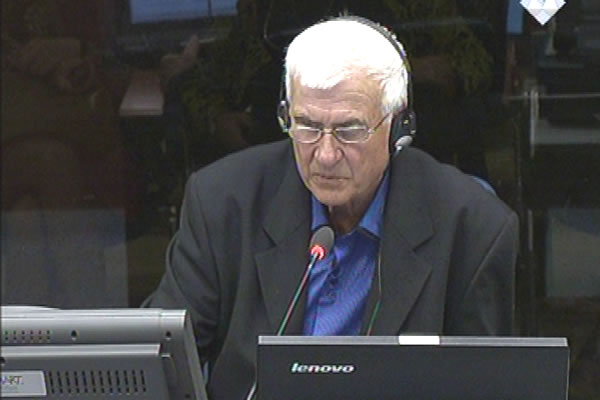Home
NOT A WORD ABOUT SREBRENICA VICTIMS
Ratko Mladic's defense witness agreed that after the fall of Srebrenica 'some' of prisoners were executed. His 'upbringing' and his 'respect for the victims' didn't allow to speculate on the numbers. The witness refused to accept the prosecution's allegation about 'thousands', of victims
 Tihomir Stevanovic, defence witness at Rako Mladic trial
Tihomir Stevanovic, defence witness at Rako Mladic trial At the beginning of the cross-examination of retired Bosnian Serb Army lieutenant colonel Tihomir Stevanovic, the prosecutor focused on the issue of the Srebrenica genocide. In July 1995, the witness was a signals officer in the VRS Main Staff and the prosecutor was keen to find out if the witness knew that 'thousands of husbands and sons from Srebrenica' were executed in July 1995, after the town fell. 'I don't know the number, but some of them were indeed executed', the witness responded. Yesterday, in the examination-in-chief Stevanovic said that there had been no orders to commit crimes from the VRS Main Staff while the accused Ratko Mladic was the commander.
Prosecutor McCloskey didn't leave it at that, asking Stevanovic if he had any 'idea' about the scale of the crime and the number of victims. Stevanovic couldn't accept the claim that 'thousands' had been executed. That might mean that there were 20,000 victims, the witness remarked. When the prosecutor repeated the question, Stevanovic replied that his 'upbringing' and 'respect for the victims' prevented him from speculating on the number of executed prisoners. He, Stevanovic added, was not prepared to give off-the-cuff estimates.
During the two days of the Srebrenica operation, on 13 and 14 July 1995, Lieutenant Colonel Stevanovic remained in his native village of Lijesanj in the Zvornik region. At that same time, the prosecutor stressed, the men and boys from Srebrenica were transported to other municipalities in the region where they were detained and executed at several execution sites near Zvornik. Stevanovic denied any knowledge of the events. Again, like most other defense witnesses from the Bosnian Serb military leadership, Stevanovic claims that he heard about the crimes only after the war, from the media.
In the second part of the cross-examination, the prosecutor concentrated on a claim the witness made yesterday. Stevanovic argued that the communications between the Main Staff and the various corps commands, including the Drina Corps, 'could and should have been encrypted and in fact they were'. The Drina Corps played the key role in the attack on Srebrenica. The witness thus implied that the intercepted conversations admitted into evidence as prosecution exhibits were not authentic. Today the witness readily agreed with the prosecutor's suggestion that there were two communication lines between Mladic's Main Staff and the Drina Corps. One line of communication was encrypted, the other was not. Stevanovic noted that the unprotected communication line was 'rarely used'.
A part of the cross-examination also centered on Stevanovic's claim that some orders during the Srebrenica operation were written on Mladic's behalf without his knowledge. The claim prompted the presiding judge to ask the witness if he really believed that someone would dare to write and send out documents in the name of the top military commander, behind his back. The witness said it was possible, because thus the authors were sure that the orders they sent would be implemented.
In the second part of the hearing, the defense called Janko Kecman, a former pilot in the JNA and later Krajina Serb army, who began his evidence.
Linked Reports
- Case : Mladic
- 2015-05-06 CRIMES WERE NOT ORDERED
- 2015-05-05 'TRIAGE' AT SREBRENICA EXECUTION SITES
- 2015-05-04 'EXTIRPATION' IN PRIJEDOR
- 2015-05-11 SETTING UP EXECUTION SQUAD FOR BRANJEVO
- 2015-05-12 WAS PECANAC MLADIC'S MAN FOR 'SPECIAL TASKS'?
- 2015-05-12 WHO WERE THE VICTIMS OF ORIC'S ATTACK ON BIJELOVAC: CIVILIANS OR SOLDIERS?
